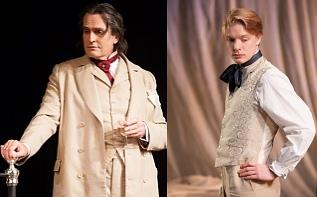The Judas Kiss Review 2013
First performed in 1998, this play by David Hare concentrates on two pivotal points in the life of Irish writer and poet Oscar Wilde (1854 to 1900). Rather than surveying Wilde's life, or attempting to relate the complete story of the relationship between Wilde and his younger lover, Lord Alfred Douglas (more often known by his nickname 'Bosie'), Mr Hare's play tries to answer two basic questions. First, when given the opportunity, why did Wilde refuse to scarper abroad to avoid prosecution for gross indecency? And, second, what happened to the relationship between Bosie and Wilde once they were reunited after Wilde's conviction and consequent incarceration in prison?
The first half of the play is set in the Cadogan Hotel. The court case against the Marquess of Quuensbury (which Wilde brought against him for libel) has collapsed and it seems likely that Wild is going to be arrested on charges of gross indecency. Wilde's friend Robert Ross is trying to organise Wilde's escape overseas to avoid prosecution, but Wilde seems more interested in having lobster for lunch and swilling down copious quantities of wine. And the petulant, child-like Bosie wants Wilde to remain with him in London, a standpoint which seems to seal Wilde's fate.
In the second half, we find Bosie and Wilde in Naples. Wilde has served his time in prison and is now pretty-much a broken man, but his intellect and wit is nonetheless in tact. The pair have no money and their circumstances are dire, though Bosie still manages to find the means to seduce young, male members of the local population.
Rupert Everett takes on the challenging role of Wilde and is hugely impressive. In almost every way, Mr Everett describes Wilde as a larger-than-life character, even to the extent that his clothes seem to have been designed to accentuate his size. Witty and flippant, Mr Everett's Wilde captures the essential magnetic charisma that so many people found alluring in the persona. But he also endows Wilde with piercing intellect that far exceeds that of his aristocratic lover.
With boyish good looks, Freddie Fox certainly possess all the physical attributes for the role of Bosie Douglas, and these contrast perfectly with Wilde's. And that is important, because the two men were a kind of 'odd couple' differentiated by age, physical appearance as well as intellect. But Mr Fox is also highly convincing as a petulant and ultimately self-centred personality.
Astutely directed by Neil Armfield, this production is a transfer from the Hampstead Theatre where it had a successful run in the autumn of last year, and it looks set fair for more success now that it is firmly established in the West End. There is still considerable interest in Wilde and the story of this famous pair is still compellingly seductive. I am not sure, though, that 'The Judas Kiss' tells us very much more about the relationship between Wilde and Lord Alfred Douglas than we already knew, even if David Hare's analysis does highlight the differences (at least as he sees them) between the two lovers in terms of motivation. However, it is a powerful and hypnotic drama, and certainly worth seeing for Rupert Everett's very fine Wilde.
"Fine production... Rupert Everett's brilliant and deeply felt performance as Wilde... hauntingly sad and touching play."
Charles Spencer for The Daily Telegraph
"Extraordinary moving...obligatory viewing."
Paul Taylor for The Independent
"Rupert Everett is a revelation as Oscar Wilde...finely judged production."
Henry Hitchings for Evening Standard
Originally published on
